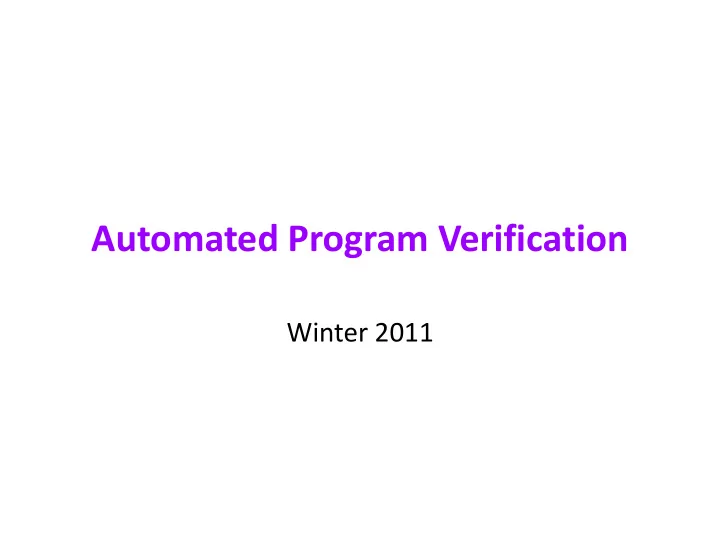

Automated Program Verification Winter 2011
Guaranteeing Program Correctness � Programs should behave how we want them to � Example: not crashing with an unexpected exception � To guarantee this: 1. Specify what a program’s behavior should be 2. Check / enforce that a program satisfies the specification
Method Specifications � Preconditions : must be true when the method is called � Postconditions : must be true when the method exits if the preconditions were met � Return value � Exceptions that are raised and under what conditions � Side-effects REMEMBER: What does it mean for a method to have stronger preconditions than another method? Stronger postconditions?
Representation Invariants � Must be true at the end of a constructor � Must be true before and after every public method � In CSE331, you check these at runtime with a ����������� method
Banking Example ���������������������������� Has Specs: ☺ ☺ ☺ ☺ ��������������������� ������������������������ !��"�#$� Specs True: ??? �%�&�'����'���%��������( ��)�**��'��'���+������� ��� ��������������������� �������������(�, ��)%�-��%�����.��'�������� ��)%�-��%���������.��'�//���.��'�0������������� !��"�#$� ��)����%��� ��1�'���+������� ��.�2�'���+������� 0���.��' �������&.�2��%�2�'���'���%���.��'������������0����.��'(�, ,
Banking Example: Runtime Assertions ���������������������������� ��������������������� ��� ������������������ !��"�#$� �%�&�'����'���%��������( ��)�**��'��'���+������� ��� ��������������������� �������������(�, ��)%�-��%�����.��'�������� ��)%�-��%���������.��'�//���.��'�0������������� !��"�#$� ��)����%��� ��1�'���+������� ��.�2�'���+������� 0���.��' �������&.�2��%�2�'���'���%���.��'���� �������� �������� �������� ����������(� ��(� ��(� ��(���������0����.��'( �������� �������� �������� ����������(� ��(� ��(� ��(� , �%�&�'��&.�2� �%�&�'��&.�2� �%�&�'��&.�2� �%�&�'��&.�2��������� �������� �������� ����������� ��� ��� ��� ����%'�����������������( ����%'�����������������( ����%'�����������������( ����%'�����������������( ����%'��������������//�������������� !��"�#$��( ����%'��������������//�������������� !��"�#$��( ����%'��������������//�������������� !��"�#$��( ����%'��������������//�������������� !��"�#$��( , , , , , Run-time checks that the program satisfies the specification
Banking Example: Pluggable Type Checking ���������������������������� ��������������������� ��� ������������������ !��"�#$� �%�&�'���3) �3) �3) �3)#.�#��� #.�#���3�� #.�#��� #.�#��� 3�� 3�� 3����'���%��������( ��)�**��'��'���+������� ��� ��������������������� �������������(�, ��)%�-��%�����.��'�������� ��)%�-��%���������.��'�//���.��'�0������������� !��"�#$� ��)����%��� ��1�'���+������� ��.�2�'���+������� 0���.��' �������&.�2��%�2�'��3) �3) �3)#.�#��� �3) #.�#��� #.�#���3�� #.�#��� 3����'���%���.��'����+�+�+�, 3�� 3�� �%�&�'��&.�2������������ ����%'�����������������( ����%'��������������//�������������� !��"�#$��( , Unnecessary! The type checker enforces this for us! ,
Banking Example: Formal Proof ���������������������������� ��������������������� ��� ������������������ !��"�#$�� �%�&�'����'���%��������( ��)�**��'��'���+������� ��� ��������������������� �������������(�, ��)%�-��%�����.��'�������� ��)%�-��%���������.��'�//���.��'�0������������� !��"�#$� ��)����%��� ��1�'���+������� ��.�2�'���+������� 0���.��' �������&.�2��%�2�'���'���%���.��'������������0����.��'(�, , Manually find weakest preconditions, inductive properties, and loop invariants (as in PS5)
Specification Approach Comparison Method Checked at Automatically Documentation Express all compile-time checked consistency properties � � � � ☺ ☺ ☺ ☺ � � � � ☺ ☺ ☺ ☺ Assertions ☺ ☺ ☺ ☺ ☺ ☺ ☺ ☺ � � � � � � � � Pluggable Type Checking ☺ ☺ ☺ ☺ � � � � ☺ ☺ ☺ ☺ ☺ ☺ ☺ ☺ Formal Proofs ☺ ☺ ☺ ☺ ☺ ☺ ☺ ☺ ☺ ☺ ☺ ☺ ☺ ☺ ☺ ☺ Automated formal proofs
Expressing Rich Specifications � Need to express conditions such as � '���+������� ��.�2�'���+������� 0���.��' � %�'�%������*���4��� ��2�5��.'��%1��� � ����������'��.*�'����%%�6��%�������'����7 in a way that a computer can understand and (hopefully) check automatically � Our expression language needs support for: � logic (e.g., if / else, quantification) � programming concepts (return values, side- effects)
Java Modeling Language (JML) � Formal language for writing specifications � Advantages / disadvantages of using a formal language instead of natural language: � Precision � Expressiveness � Write in program comments; numerous tools can use the specification to: � Generate documentation � Automatically generate unit tests � Check that the code meets the specification � Website: http://www.eecs.ucf.edu/~leavens/JML/
CSE331 vs. JML Specifications CSE331 Specification JML Specification requires @requires <expr> modifies @modifies <expr>, <expr> METHOD @pure (Method does not modify any member vars) returns effects @ensures <expr> throws @exsures (Exception) <expr> What is true when the method throws the given exception. E.g., @exsures (IllegalArgumentException) x == null CLASS RI: @invariant <expr>
JML Expressions Expression Meaning a ==> b a implies b a <==> b a is true if, and only if, b is true; same as a == b \result the return value of the method Refers to the value of <expr> at the entry of the method \old(<expr>) 8*.%��� �2���4(�����%4 Universal quantification a && b Just like in Java a || b Just like in Java !a Just like in Java
Recommend
More recommend